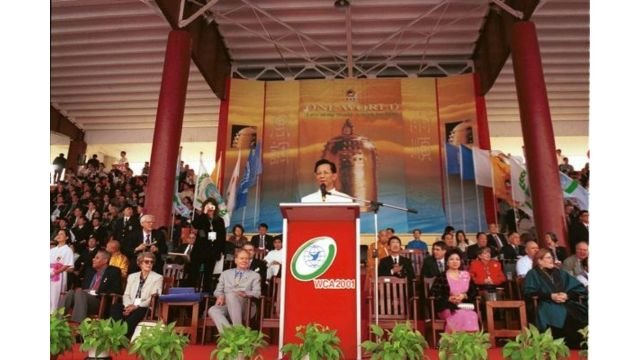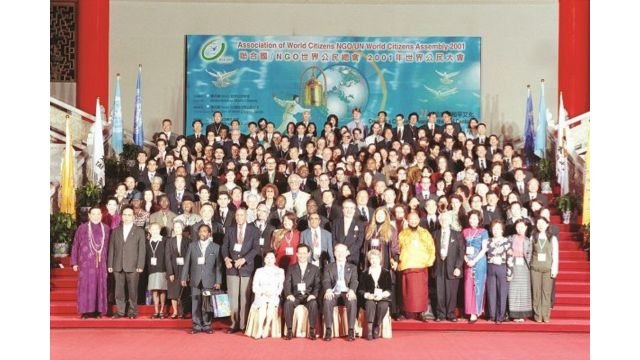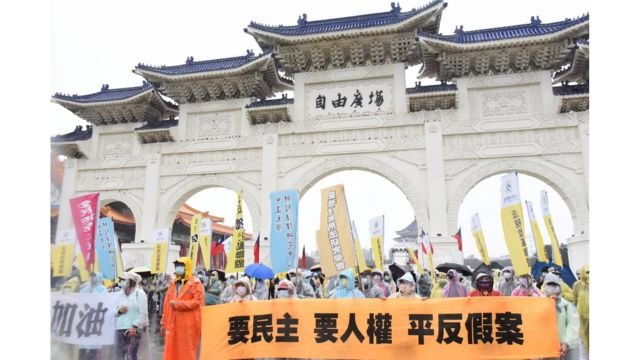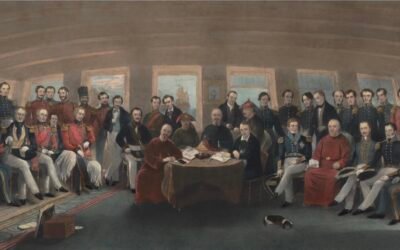Celebrating the “World Citizenship Day” means also honoring the intrinsic right of every citizen to FoRB, which significantly contributes to a better society.
by Marco Respinti*
*A paper presented via video at the International Forum on World Citizenship Day 2025 “Transitional Justice Through Effective Relief: The Tai Ji Men Case as an Example,” Taipei, April 1, 2025.

Today is a special day for the Republic of China in Taiwan. The state and the people of Taiwan celebrate, as do other countries and institutions, the “World Citizenship Day.” I would like to emphasize the importance of this date. In fact, there are countries that celebrate “World Citizens Day,” an equivalent day of remembrance, on November 4. On the one hand, this highlights Taiwan’s distinctiveness—a distinctiveness that the entire world should cherish, respect, and defend. On the other hand, it underscores the importance of focusing specifically on Taiwan and its democracy—a focus that should be shared both by the Taiwanese people and the rest of the world.
The special “World Citizenship Day” distinguishes Taiwan and the countries and organizations following it in the April 1 celebrations with a variation on a common, compelling theme. It emphasizes how differences are precious and vital to the organic unity of humankind, which rejects sterile homogenization. This is a gift bestowed upon the people and institutions of Taiwan and the world by the remarkable World Citizens Assembly that took place in 2001, beginning on March 30 and gathering 20,000 delegates from around the world at Taipei Municipal Stadium. It was there that Dr. Hong Tao-Tze, the Shifu (Grand Master) of Tai Ji Men, in his role as Vice President of the Association of World Citizens, solemnly declared April 1, starting in 2001, as “World Citizenship Day.”

We are not mistaken in saying that the April 1 “World Citizenship Day” is a gift brought to Taiwan and the world by Tai Ji Men, a menpai (similar to a school) of martial arts, Qigong, and self-cultivation that emphasizes the centrality of human conscience in all human endeavors, and actively works for peace and mutual understanding worldwide. This is achieved through a range of public activities that have been recognized by leaders and institutions around the world.
Now, Tai Ji Men—this precious Tai Ji Men—is also subjected to a blatant case of injustice and discrimination that, since December 1996, has harassed its people, caused severe suffering, and shamefully nationalized the movement’s private property. These two realities can no longer coexist. Tai Ji Men, which has been repeatedly proven innocent by all levels of the Taiwanese judiciary, including the Supreme Court, is an important resource for Taiwan, and through Taiwan, for the entire world. Yet, its people are being deprived of their basic human rights, starting with the practical annihilation of their fundamental right to freedom of religion or belief.

Citizens’ initiative and personal responsibility as members of a state are key elements of true democracy. In other words, it is not a true democracy where citizens’ initiatives are not highly valued and where people are miseducated to abdicate their personal responsibility. A fundamental part of citizens’ initiatives and human responsibility is the entire range of activities that stem from the right to religious liberty of the citizens themselves. Let us recall, once again, that freedom of religion, belief, or creed (FoRB) does not only concern the private, intimate sphere of an individual, but, from that private sphere, also affects the public sphere. FoRB is both the right to believe and to live according to that belief, with total respect for natural law and just laws.
Celebrating the “World Citizens Day” also means honoring the intrinsic right to FoRB of every citizen, which significantly contributes to a better society. The fact that Tai Ji Men played such a key role in the establishment of the April 1 “World Citizenship Day” highlights this clearly.
Irish philosopher and statesman Edmund Burke (1729–1797) was an ardent proponent of the idea that there is decisive wisdom in the ways of a people. No one can mistake Burke for a partisan of populist democracy. Quite the contrary, he was a defender of a well-structured society, where customs and traditions are respected, and religious institutions play an undeniable role in preserving a wealthy society. There is something almost mystical in the ability of a people to wisely pursue initiatives, grounded in a deep respect for the spiritual meaning of existence, for the sake of the public good. Institutions should recognize this and collaborate with citizens for a better world. This is Burke’s perspective, and I am sure that Dr. Hong would subscribe to it, adding that the pivotal instrument here is human conscience.
My wish today is that “World Citizenship Day” celebrated every year on April 1 returns to its original vision and honors the wisdom of the people, rooted in their spiritual dimension, as a key to the success of a prosperous democracy. Taiwan can easily begin today by securing equal treatment and freedom of religion or belief for all its citizens.

Marco Respinti is an Italian professional journalist, member of the International Federation of Journalists (IFJ), author, translator, and lecturer. He has contributed and contributes to several journals and magazines both in print and online, both in Italy and abroad. Author of books and chapter in books, he has translated and/or edited works by, among others, Edmund Burke, Charles Dickens, T.S. Eliot, Russell Kirk, J.R.R. Tolkien, Régine Pernoud and Gustave Thibon. A Senior fellow at the Russell Kirk Center for Cultural Renewal (a non-partisan, non-profit U.S. educational organization based in Mecosta, Michigan), he is also a founding member as well as a member of the Advisory Council of the Center for European Renewal (a non-profit, non-partisan pan-European educational organization based in The Hague, The Netherlands). A member of the Advisory Council of the European Federation for Freedom of Belief, in December 2022, the Universal Peace Federation bestowed on him, among others, the title of Ambassador of Peace. From February 2018 to December 2022, he has been the Editor-in-Chief of International Family News. He serves as Director-in-Charge of the academic publication The Journal of CESNUR and Bitter Winter: A Magazine on Religious Liberty and Human Rights.



